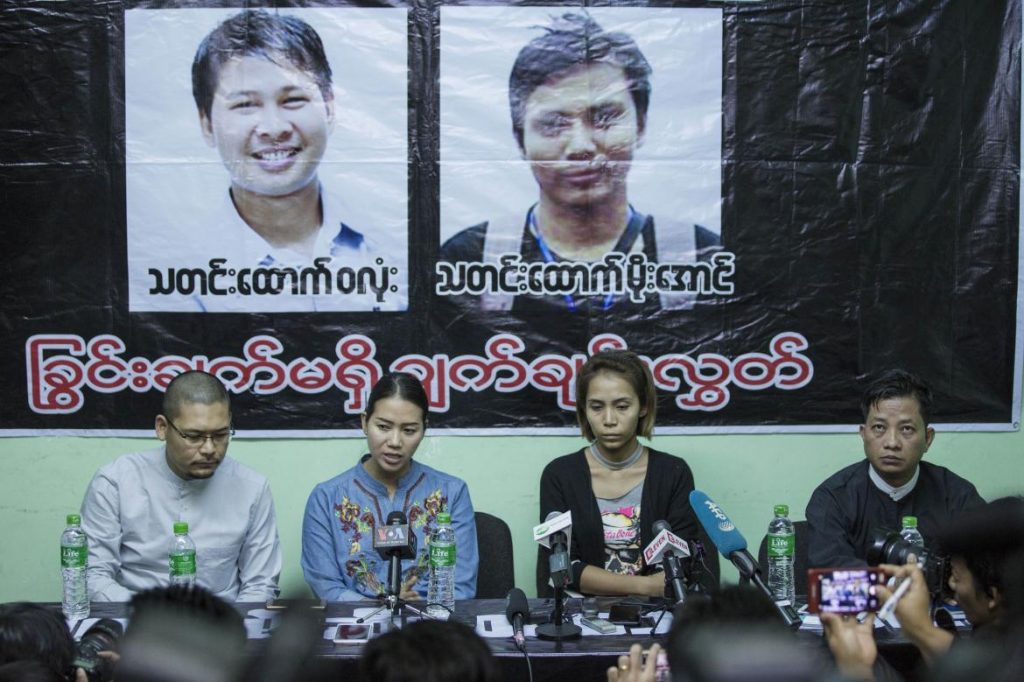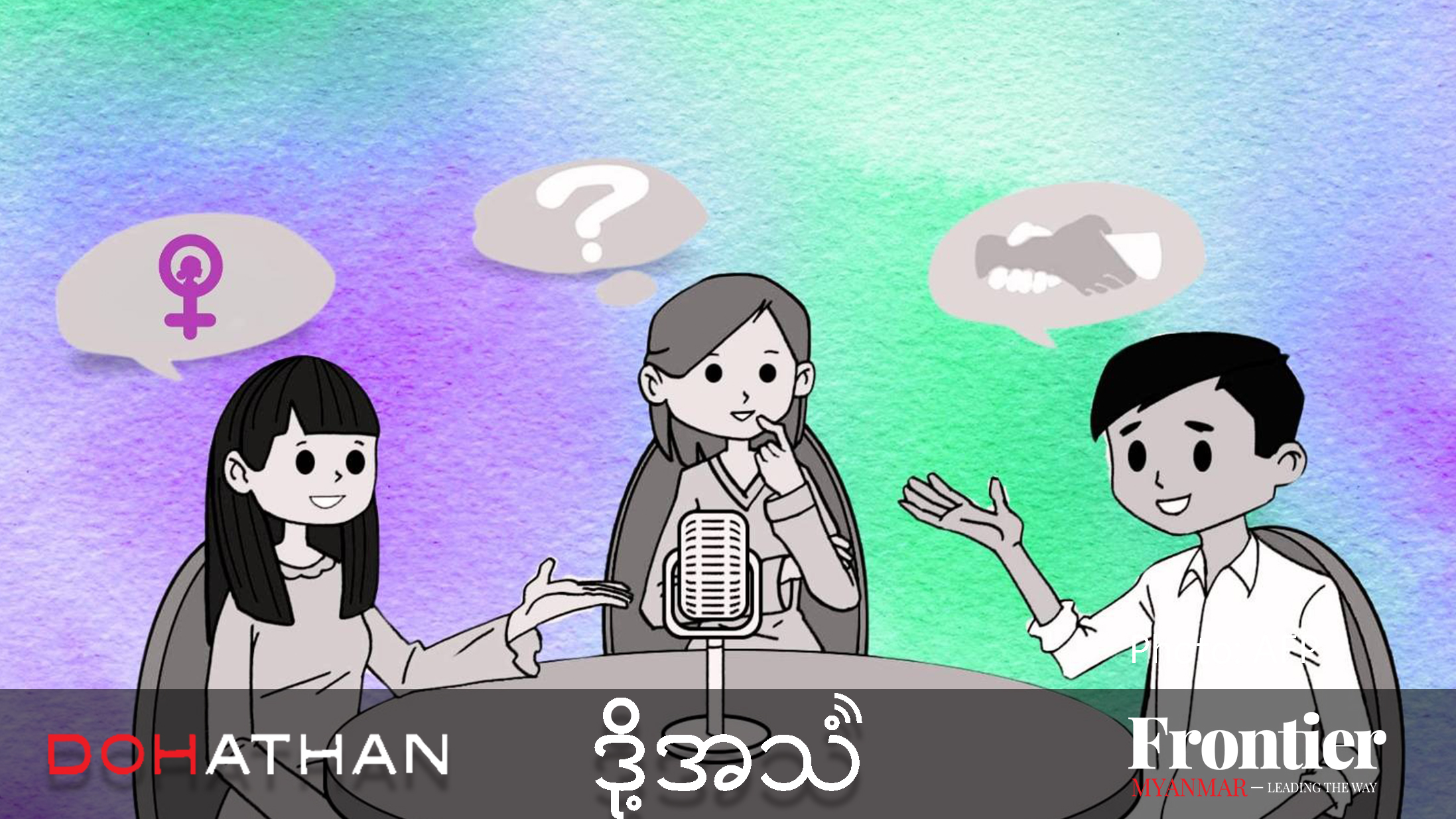Optimism for media reform was pervasive among journalists in the early years of the last government but has virtually evaporated since the NLD came to power.
By SITHU AUNG MYINT | FRONTIER
THE ARREST of two Reuters journalists under curious circumstances on Yangon’s outskirts on the night of December 12 has made headlines in Myanmar and around the world. The US embassy in Yangon expressed deep concern at their “highly irregular” arrests, which have been condemned by many other countries, the United Nations and domestic and foreign media organisations.
It’s a challenging time to be a journalist in Myanmar. Two foreign journalists, from Singapore and Malaysia, and their Myanmar interpreter and driver, have been jailed for trying to fly a drone near the Pyidaungsu Hluttaw (national parliament) in Nay Pyi Taw in late October while on assignment for Turkey’s TRT news agency. The rising number of legal cases brought against journalists is creating anxiety in Myanmar newsrooms. It is also raising questions about whether press freedom has advanced or regressed under the National League for Democracy government headed by State Counsellor Daw Aung San Suu Kyi.
It is instructive in assessing media freedom in Myanmar to compare the situation under the NLD with that under the previous Union Solidarity and Development Party government.
There was no media freedom in Myanmar under junta rule. Any report intended for publication or broadcast was required to undergo pre-publication censorship by the Ministry of Information’s Press Scrutiny and Registration Division, which began as the Press Scrutiny Board formed after General Ne Win seized power in 1962.
Support more independent journalism like this. Sign up to be a Frontier member.
The censorship was draconian; reports about politics, the economy, ethnic affairs, civil conflict, the Tatmadaw, crime, drug trafficking and abuse, and Daw Aung San Suu Kyi and the NLD were likely to be rejected in their entirety if they were not mutilated by mandatory cuts. Even stories that might seem to be trivial were censored.
President U Thein Sein began liberalising the media and easing restrictions on it after his USDP government took office in 2011. Journalists celebrated when odious pre-publication censorship was terminated on August 20, 2012. PSRD was abolished the following January. April 2013 saw the launch of the first independent daily newspapers since 1964, under a decision foreshadowed by the government months earlier. The junta had only tolerated private sector weekly papers because they allowed ample time for checking by the censors. The government’s decision to allow private sector dailies was a milestone in the history of media reform in Myanmar.
The atmosphere of optimism created by the reforms led to some journalists going so far as to demand the abolition of the Ministry of Information. The then minister, U Ye Htut, proposed that the ministry be gradually transformed into a Public Service Media independent of government control, but work on the idea stalled. Another reform by the USDP government was its enactment of a Broadcast Media Law to liberalise radio and television, but a lack of enabling regulations has prevented its implementation. Late in the USDP government’s term, journalists and the Ministry of Information cooperated on drafting a Right to Information Law.
Since the NLD took office, with former writer and editor U Pe Myint as minister for information, little has been heard about the unfinished efforts to draft the Broadcast Media Law regulations, transform the ministry into a Public Service Media and enact a Right to Information law.
However, the ministry has licensed five private companies as “content providers” to MRTV, under which they will be given one digital channel each. They have been required to lodge a bond with the ministry and their licenses can be withdrawn if they violate the terms of their contracts. They will have to compete for advertising revenue in an already competitive market and are not enthusiastic about launching the channels.
Despite setbacks in other areas, Pe Myint’s interest in the literary sector, as a former editor, writer and publisher, has been reflected in a marked improvement in the publication of books and periodicals. Authors have been encouraged to write and publish on a wide range of topics and there’s been a noticeable increase in literature festivals, including for children, as well as book fairs and literary seminars.
There are plans for 100 books to be published with the support of government subsidies but few are likely to be devoted to the topic of press freedom.
The advent of the NLD government has seen the Tatmadaw, and the Tatmadaw-controlled Ministry of Home Affairs, taking a harder line against journalists than it did during the USDP administration. During the past year, the Tatmadaw has brought charges against a total of six journalists for a range of offences, including alleged breaches of the Unlawful Associations Act, the section 66(d) criminal defamation clause of the Telecommunications Law, and defamation under section 502 of the Penal Code. The Tatmadaw withdrew the charges against the six journalists on September 1 in what it said was a goodwill gesture.
The foreign journalists arrested with a drone in Nay Pyi Taw were convicted under the 1934 Burma Aircraft Act and the two Reuters reporters face charges under another colonial era law, the 1932 Burma Official Secrets Act, for which the maximum penalty is 14 years’ jail. The government can do nothing about those cases other than look on.
Taking all into consideration, media freedom has deteriorated under the NLD government.







